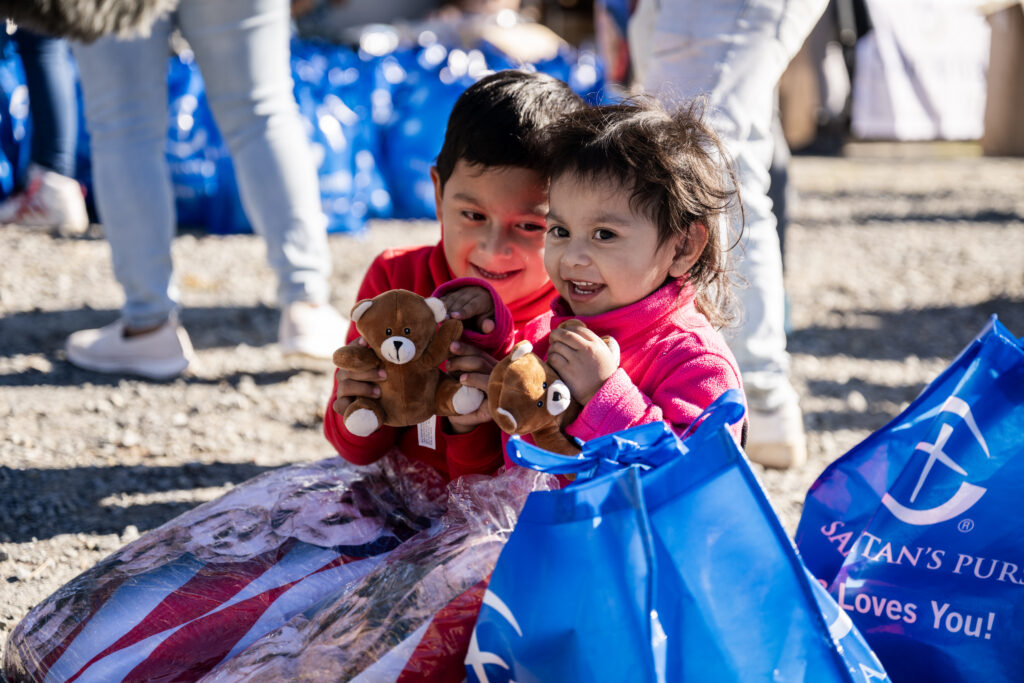Philanthropy Roundtable’s Free to Give campaign elevates the voices of everyday Americans who have dedicated their careers to supporting those in need. Their work is made possible by the freedom of all Americans to give to the causes and communities they care about most.
When disaster strikes, the world often witnesses both immense devastation and an outpouring of kindness. In the aftermath of Hurricane Helene, which ravaged the Southeast in 2024 with catastrophic flooding, landslides and widespread destruction, Samaritan’s Purse stood as a beacon of hope, proving that faith-driven philanthropy has the power to change lives.
“Samaritan’s Purse was founded on the story of the Good Samaritan. In Luke 10:30-37, God makes it clear that when people are in need, we are called to help them. This is what Samaritan’s Purse does,” Luther Harrison, vice president of North American Ministries for Samaritan’s Purse, said to the Roundtable in March 2025. This principle has driven the organization’s global relief efforts, ensuring that when a crisis unfolds, help is on the way—swiftly and effectively.
A Mission Rooted in Compassion
When Hurricane Helene struck, Samaritan’s Purse responded immediately, deploying teams to some of the hardest-hit regions, including Florida, Georgia and multiple locations in western North Carolina. “Our goal is to have staff on the ground in 12-24 hours depending on the location, and then we build our program based on the needs,” said Harrison.
Roads were washed out, homes were destroyed and thousands were left without power. Yet, amid the wreckage, Samaritan’s Purse volunteers embodied the spirit of service, clearing debris, cutting down fallen trees and helping families begin the long journey toward recovery.
Pastor Charles English and his wife, Sadie, have been residents of Barnardsville, North Carolina, for five decades, living along a serene branch of the French Broad River called Ivy Creek. On September 27, Hurricane Helene transformed Ivy Creek into a destructive force, inundating their home with torrents carrying boulders, trees and exploding propane tanks. The flood devastated their property, leaving them with nothing but the clothes they were wearing as they sought safety.
Among their significant losses was their car, which they had used extensively to serve their church community and neighbors. Recognizing their dedication and the critical role transportation played in their ministry, Samaritan’s Purse provided the couple with a new car.
Why the Freedom to Give Matters
Franklin Graham, president of Samaritan’s Purse, has long championed the role of the church as a first responder in every crisis. He recently told Christian Post, “The government cannot solve all of these problems. … Hopefully, somebody like Samaritan’s Purse will be there to help you. But still, if people want to sit back and wait for the government to do everything, it’s not going to happen.”
Samaritan’s Purse operates without government grants in the United States, relying entirely on donations from individuals who believe in their mission. The freedom to give allows Americans to give to the causes they care most about and helped Samaritan’s Purse react swiftly after Hurricane Helene. This immediate outpouring of donations rooted in compassion allowed Samaritan’s Purse to immediately deploy in hardest-hit communities, providing relief without bureaucratic red tape.
“We are able to avoid the red tape and bureaucracy and get aid immediately to the people in need. Partnering with local churches helps us have a trusted partner in the community, and they are in tune with the local needs,” said Harrison.





A Rapid Response Unlike Any Other
The agility of Samaritan’s Purse in responding to disasters sets it apart from encumbered government responses. “We have staff and key volunteers who are prepared to respond quickly. We have also been blessed with many church partners and when the storms hit, we partner with the church to reach out to the community,” said Harrison.
“We also have Disaster Relief Units loaded and ready for immediate deployment. These are tractor-trailers stocked with tools and equipment—everything we need to help mobilize volunteers to serve families in need. We have five of these tractor-trailers based in North Carolina, two in Texas and one in California. When a disaster hits, we are able to quickly mobilize staff and equipment to help families in need in Jesus’ name.”
During Hurricane Helene, this efficiency led to one of the most significant civilian airlift operations in U.S. history, with over 380 air missions delivering more than 700,000 pounds of supplies to communities cut off from essential resources. Samaritan’s Purse was not just offering relief but also restoring hope.
Power of Volunteerism and Community
One of the most remarkable aspects of disaster recovery is the resilience of the human spirit. Over 40,000 volunteers came together in the wake of Hurricane Helene, many inspired by their faith and a deep sense of community.
While significant strides have been made, the road to recovery is long, especially in western North Carolina, where the scars of Hurricane Helene remain deeply embedded in the landscape. Families are still making tough decisions about their futures, and volunteers are still needed.
By joining efforts with Samaritan’s Purse, you can play a crucial role in restoring not just homes, but hope, faith and communities. In the face of disaster, the true measure of a society is found in its response. Samaritan’s Purse, fueled by faith and philanthropic freedom, continues to be a testament to what can be achieved when compassion meets action.
To learn more about Samaritan’s Purse, please contact Esther Larson, senior director of programs at Philanthropy Roundtable here.

